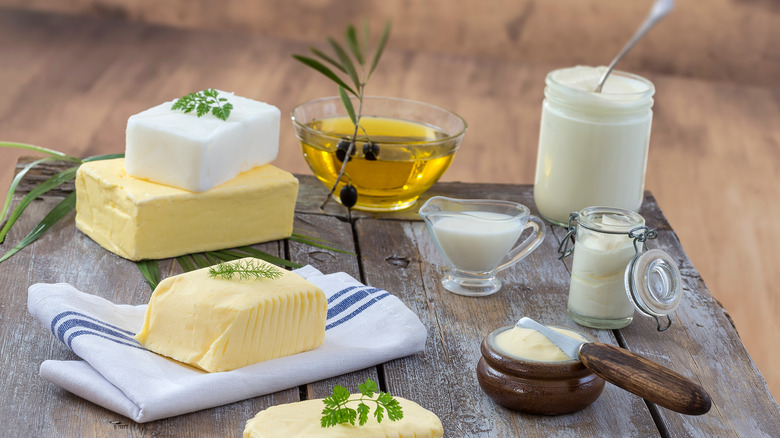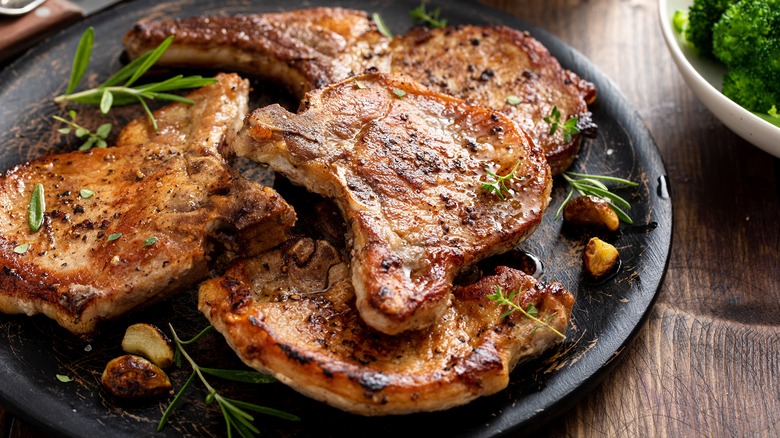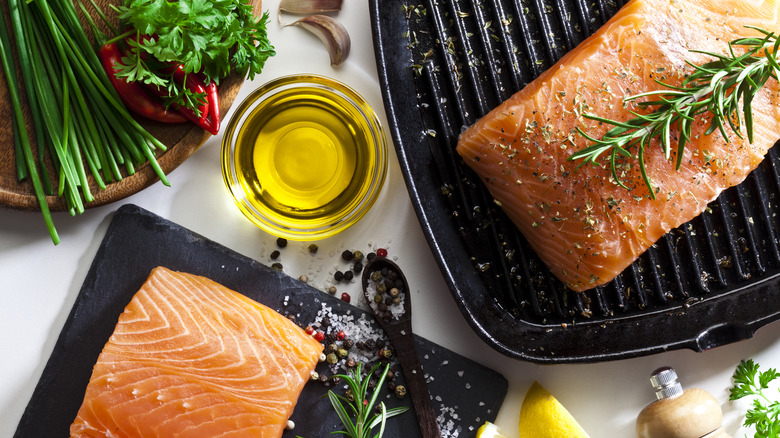Why It's Important To Choose The Right Fat When Cooking With Your Broiler
With a flood of high tech and new-fangled gadgets on the market, it's sometimes easy to overlook one tool that nearly every home kitchen already has — and that's the broiler. A broiler is a powerhouse heat source, as it delivers high heat super fast, which is useful in everything from creating a perfectly seared protein like steak, to getting that crackable crust on a dessert like crème brûlée.
But despite being pretty readily-available and inarguably useful, many people find the broiler a bit intimidating. That's probably because the intensity of this cooking technique can result in some culinary catastrophes if you're not careful. Forget about your food in the broiler even for a moment and you could end up with incinerated ingredients. But there is one tip that will help you minimize your risk of ruining a broiled masterpiece. By choosing the right cooking fat that won't scorch when exposed to intense direct heat, you'll be taking a major step in the right direction.
The best fats for broiling purposes
While broiling is a great way to enhance your dish with some complex, caramelized flavors and crisp, contrasting textures, this guideline may preclude some of your go-to cooking fats. Butter lovers beware, as the smoke point of this delicious lipid is around 350 degrees Fahrenheit. Given that your broiler could get up into the 500-degrees Fahrenheit range, you could wind up with smoke billowing from your oven's broiler, instead the aroma of whatever it is you're cooking.
And while there are competing opinions on whether olive oil is a-okay or not your best bet for high-heat cooking, there are plenty of other options that won't have you worried about swimming in a smoke cloud while you cook. The best fats for broiling are high heat-friendly, including canola, safflower or soybean, or refined sunflower, peanut, coconut, and avocado. If you aren't accustomed to using these ingredients, this can be a great opportunity to try some recipes that feature them, like coconut oil broiled shrimp. And while butter and olive oil may not be your best friend during the broil, you can always add a pat after, or drizzle a bit to finish your dish.
More broiling best practices
When it comes to the broiler, it's important to always use cooking vessels that can handle the heat. Avoid glass, which can potentially shatter, or anything nonstick or enameled. A cast iron skillet or grill pan are great tools for the broiler, as well as a standard baking sheet.
When it comes to selecting recipes, the best options for your broiler are foods that don't need long roasting processes and can be done quickly. Broiled salmon, broiled flat iron steak, or broiled pork chops with spicy pineapple salsa are all delicious candidates. Keep in mind that there's a reason you should never use a marinade when broiling meat, and that's because you can run the risk of sparking a blaze if a liquid ingredient (particularly one comprised of flammable oil and sugars) sputters and makes contact with the heating element. Instead, a dry rub or spice blend is a great alternative (or if you must marinate, be sure to use a thin coating and not a bath).
You can also use your broiler in conjunction with another cooking method like baking. In fact, the broiler trick restaurant chefs swear by is a one-two punch that leverages this technique as a finishing touch to add a crust or sear, or encourage cheese to bubble and brown. Once you've got the best fat sorted out, your already available broiler may become your new go-to for cooking projects.


